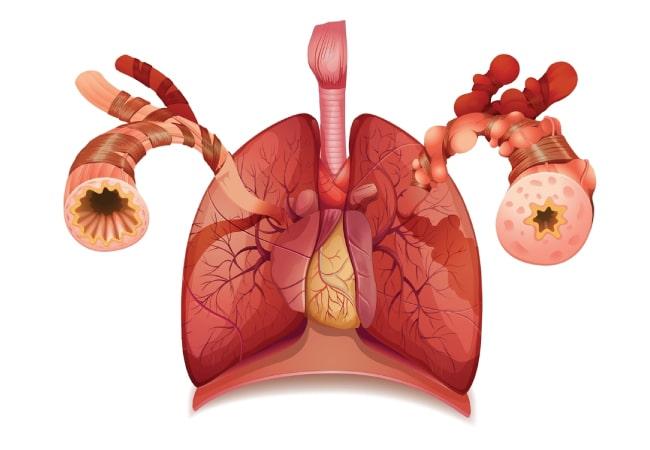What is Asthma?
Asthma is a chronic condition that causes inflammation and narrowing of the airways in the lungs. This can make it difficult to breathe and may lead to symptoms like coughing, wheezing, shortness of breath, and chest tightness.
Key Takeaways:
-
- Asthma is a significant noncommunicable disease (NCD) that affects both children and adults and is the most common chronic disease among children.
- Asthma symptoms happen when the small airways in the lungs get inflamed and narrow. This can make you cough, wheeze, feel short of breath, or have tightness in your chest.
- In 2019, around 262 million people had asthma, and it caused about 455,000 deaths.
- Apart from inhaled medicine, a novel drug Omalizumab helps control asthma, letting people with asthma live a normal, active life.
- Avoiding things that make asthma worse can help make asthma symptoms better.
- Most people who die from asthma live in low- and lower-middle-income countries. They often don’t get diagnosed or treated properly.
Causes of Asthma:
Several factors are associated with a higher risk of getting asthma, but it’s often hard to pinpoint one direct cause.
- If someone in your family, like a parent or sibling, has asthma, you’re more likely to have it too.
- People who have allergies like eczema or hay fever are more likely to have asthma too.
- Living in cities is linked to more people having asthma, likely because of different lifestyle choices.
- Things that happen early in life, like being born with low weight or prematurely, being around tobacco smoke, breathing in polluted air, or getting certain viral infections, can make asthma more likely to develop.
- Being around certain things in our environment can make asthma more likely. These include things like pollution in the air, dust mites in our homes, mold, and being exposed to certain chemicals or dust at work. These factors can increase the risk of developing asthma or make existing asthma worse.
- Being overweight or obese increases the chances of getting asthma in both kids and adults.
Symptoms of Asthma:
Symptoms of asthma can vary from person to person. When symptoms get significantly worse, is known as an asthma attack. Symptoms can be worse at night or during exercise.
Common symptoms of asthma include:
- a persistent cough, especially at night
- wheezing when exhaling and sometimes when inhaling
- difficulty breathing or shortness of breath, occasionally even when resting
- chest tightness, making it tough to breathe deeply.
Some people with asthma may have worse symptoms when they catch a cold or when the weather changes. Other triggers include things like dust, smoke, pollen, pet fur, strong smells, and certain chemicals. Sometimes, symptoms can be caused by other health issues too. If you have symptoms, it’s important to talk to a doctor to figure out the best way to manage them.
Diagnosis and Treatment:
If you experience symptoms of asthma, it’s important to see a doctor for an accurate diagnosis. They may perform lung function tests, such as spirometry, to assess your breathing. Once diagnosed, asthma can be managed with a combination of medications and lifestyle changes. The most common treatment is to use an inhaler, which delivers medicine directly to the lungs.
Apart from inhalers, Asthma can be treated with the novel medicine Omalizumab which helps control the disease and enable individuals with asthma to live a normal, active life.
Omalizumab: Omalizumab is supplied under the brand Xolair. It is used to treat asthma, mainly in those who have allergic asthma. It works by targeting a substance in the body that’s involved in allergic reactions, helping to reduce symptoms and asthma attacks. The medicine is administered as an injection under the skin every few weeks and is often used for those with severe asthma that isn’t well controlled with other medicines. It’s not a rescue medication for sudden asthma attacks but rather a long-term treatment to help prevent them. If you have asthma, talk to your healthcare provider to see if omalizumab could be a good option for you.
Lifestyle Management:
In addition to therapeutic drugs, there are steps you can take to manage asthma and reduce the risk of flare-ups:
- Avoid triggers whenever possible.
- Consider a peak flow meter to monitor the lung function.
- Follow an asthma action plan provided by your doctor.
- Stay active and maintain a healthy lifestyle.
Conclusion:
Asthma is a common condition that can be effectively managed with proper treatment and lifestyle changes. By understanding the symptoms, triggers, and treatment options, you can take control of your asthma and live a full and active life. If you have any concerns or experience worsening symptoms, don’t hesitate to seek medical advice. Remember, you’re not alone, millions of individuals around the world manage asthma successfully every day.
References:


